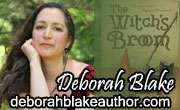
A Thought Experiment
I believe in the peoplehood of pagans.
Here's my contention: that, collectively, pagans constitute—in effect—a transnational and transethnic people.
I would contend, in fact, that pagans are, essentially, an emergent ethnic group.
So: a pagan and a non-pagan fall into a river. You can only save one. Which one do you save?
In reality, of course, moral decisions are rarely so clear-cut. But ask yourself: under these circumstances, which one would it be?
The pagan moral universe is one of graded responsibility. (Yes, there may be a few heroic souls out there who have managed to transcend such petty restrictions and truly love everyone equally. Well, good on them. I'm talking here about the rest of us poor unwashed unenlightened.) I have more responsibility to immediate family than to more distant relatives. I have more responsibility to distant kin than to non-kin. I have more responsibility to non-kin members of my tribe than to those not of my tribe. And so on, expanding outwards from self.
That said, would I save the pagan, or the non-pagan?
Usually, of course, a question of this sort implies some sort of moral weighting. I'd be more likely to save someone that I knew over someone that I didn't know, the one that I liked better, the one that I perceived as less able to help themselves.
(In the funniest set of pre-flight instructions that I've ever heard, the way-gay air steward mugged: "If you're traveling with a child, please see to your own needs first. If you're traveling with two children, please see to the needs of the most promising child first.")
All that being equal, though, Posch, which one would you save?






 Any discussion of the meaning of “Harm none” can - and should – generate plenty of questions. That’s the nature of determining our ethical behavior: our perspective shifts as we circle the problem at hand. This is necessary. The reason for ethics is to determine how to minimize damage to others, and unless we try to walk for a while in their shoes, to empathize with their viewpoint, its almost impossible to do that. This includes our own viewpoint. If we didn’t need to consider our own desire in any given matter, there would be no need for ethics. Which means we need to be very clear about why we want something, and ideally be aware of the consequences of that desire.
Any discussion of the meaning of “Harm none” can - and should – generate plenty of questions. That’s the nature of determining our ethical behavior: our perspective shifts as we circle the problem at hand. This is necessary. The reason for ethics is to determine how to minimize damage to others, and unless we try to walk for a while in their shoes, to empathize with their viewpoint, its almost impossible to do that. This includes our own viewpoint. If we didn’t need to consider our own desire in any given matter, there would be no need for ethics. Which means we need to be very clear about why we want something, and ideally be aware of the consequences of that desire.













